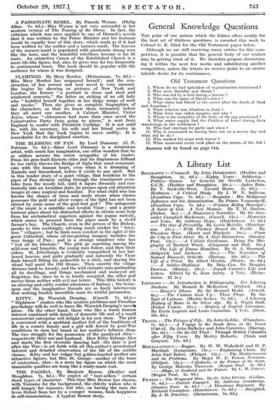THE BLESSING OF PAN. By Lord Dunsany. (G. P. Putnam.
7s. 6d.)-Since Lord Dunsany is a scrupulous artist, with much fine imagination, one often wonders that he so seldom secures the entire sympathy of his reader. From his gem-built Eastern cities and his diaphanous Elfland he too rarely throws the Bridge of Sighs that must communi- cate with the human heart, even when it is dreaming of Xanadu and Samarkand, before it yields to any spell. But in this tender story of a quiet village, that hearkens to the pipes of Pan divinely calling through the translucent even- tides from the woody hill, until it lapses dreamily and con- tentedly into an Arcadian state, he presses upon our attention images at once magical and familiar. For what child who has known the shapes of trees and reedy rivers when silence possesses the gold and silver verges of the light has not been stirred by some sense of the goat-foot god ? The antagonist of the music is a saintlike and lovable Vicar ; and a gentle humour plays about his distracted efforts to obtain some help from his ecclesiastical superiors against the pagan melody, which seems to proceed from the pipes made by a stolid farmer's boy. The Church, even in the person of the Bishop, speaks to him soothingly, advising much cricket for " frivo- lous " villagers ' • but he finds more comfort in the sight of the great Cathedral, whose all-recognizing imagery includes the very image of Pan ; and in a strange wanderer who has " lost all his illusions." The girls go searching among the wild-rose and bramble, the young men follow, and then their elders. St. Ethelburga is evidently vanquished in her hal- lowed heaven, and quite gradually and naturally the Vicar finds himself fitting his palaeolith to a stick, and slaying the ritual bull amid the Old Stones. Then sweetly the village drowses back to Arcady, and the wild clematis runs garlanding all its dwellings, and things mechanical and moneyed are forgotten, for, since he is so kindly accepted, the olden god moves them neither with evil nor terror. This little history is an alluring and oddly. cordial admission of fantasy ; the home- spun and the imaginative threads are so finely interwoven that nothing frankly incredible mars its wistful persuasion.


























































 Previous page
Previous page